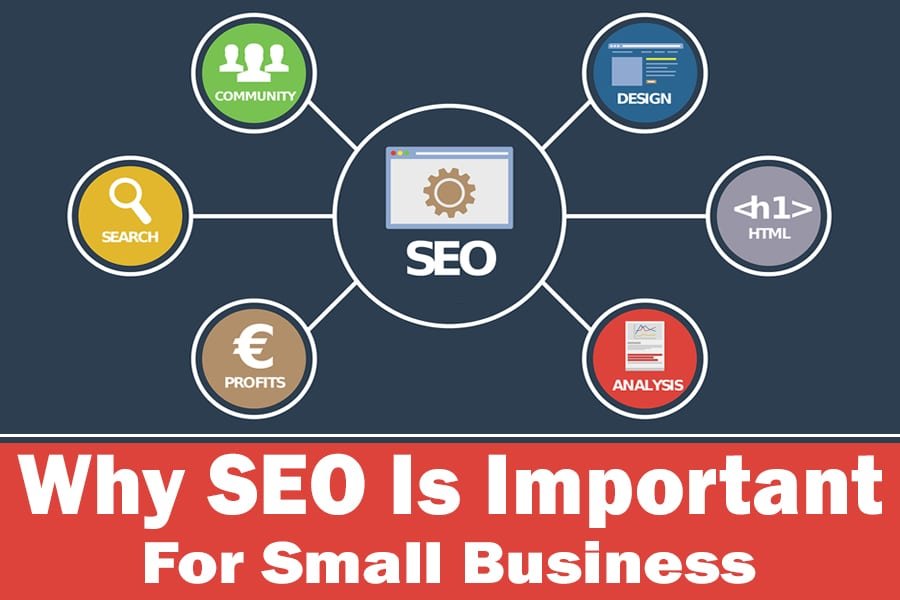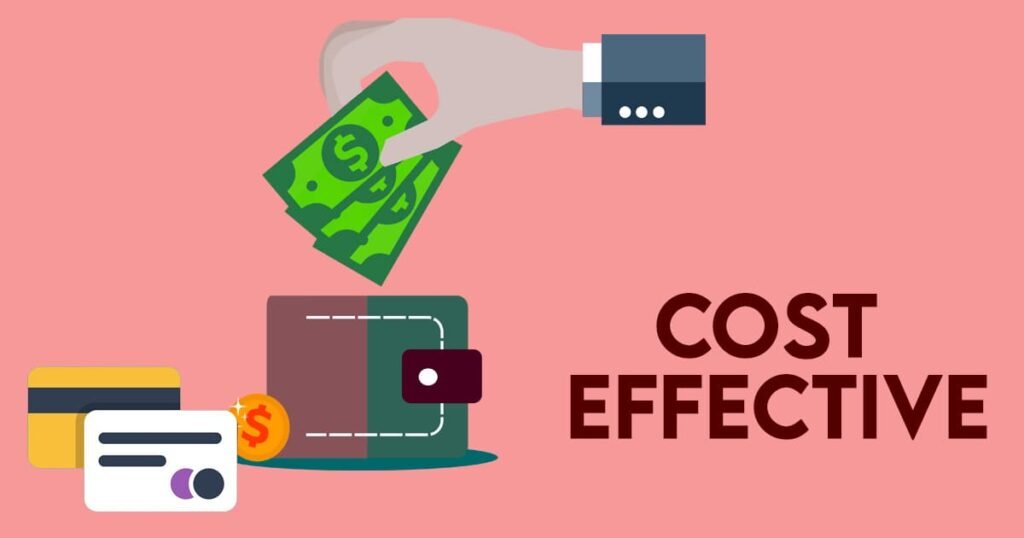
If you are here to know why SEO is important for small business, you’re in the right place!
Search engine optimization (SEO) is a digital marketing strategy that small, medium, and large corporations use. It gives businesses a level playing field, regardless of size.
As a small business, you may lack the financial capacity larger companies have to run paid adverts consistently. For instance, Procter and Gamble was one of the biggest Ad spenders in June 2023. They spent $109.3 million on adverts.
A small business may lack the capacity to spend this much money on adverts alone. But according to Bitchip Digital, one of the fastest-growing SEO companies, small corporations don’t need to spend millions of dollars to get impressive results.
So, here, we will discuss why SEO is so essential to your small business. Read on!
What Is SEO?
In our previous posts, we defined SEO. However, we’re going to treat this post as a new one. That means we’re going to define SEO.
Search engine optimization (SEO) is a digital marketing strategy that any business (regardless of size) can deploy to optimize their websites or content to improve search ranking and online visibility in SERPs (search engine result pages).
SEO involves the use of different strategies. In other words, any expert SEO agency or expert you’re working with should have a sound understanding of various search engine optimization strategies and be able to deploy them effectively to make your business successful online.
The essence of search engine optimization is to make it easier for search engines to crawl, understand, and rank websites in relevant search queries. For instance, if you optimize your website for the keyword or search term “auto repair company Florida,” your website should appear in search results when people search online with the search term.
A Handy Tip: One common mistake many businesses make when optimizing their website is trying to please search engines and abandoning their potential visitors. But that shouldn’t be the case.
A robust SEO strategy should focus on pleasing search engines and potential visitors.
Your optimization strategy should make it a breeze for search engines to crawl, understand, and rank your site. It should encourage visitors to spend more time on your site and take action (buy your products, order your services, or subscribe to your newsletter).
In general, search engine optimization is vital for your small business. Even large corporations invest in SEO. Here’s what it can do to your startup business.
1: SEO makes small businesses visible to potential customers:

Let’s assume you run a small business (jewelry, personal trainer, property management, cleaning service, food truck, etc). Your business is new, and you’re competing with other established brands. How can you station your business online where potential customers can find and contact you? The answer is SEO.
With SEO, you can place your business where potential customers can find you online. In other words, when they search on Google and other search engines with the keyword or search term you’re targeting, your website will appear on their search result pages.
One of the SEO strategies to improve online visibility involves optimizing a website for mobile search. Potential customers using their mobile phones to search online will easily find your website.

Google considers mobile-friendliness a critical ranking factor. That means sites that aren’t mobile-friendly will rank lower.
More searches are now done on mobile devices (64%) than on desktops (35%). Another thing you need to take note of is that there are more mobile phones (8.58 billion) than people (7.95) billion in the world.
A Handy Tip: A robust SEO strategy should include optimizing your website for mobile and desktop searches. This way, you will get organic traffic from both channels.
So, consider SEO if you want your small business to be visible online. The age or size of your company doesn’t matter. The type of business or brands you compete against also doesn’t matter. An effective SEO strategy can make your business popular and dominant in your business niche.
Let’s discuss another way you can increase your website’s online visibility via SEO?
We have mentioned mobile-friendliness as one of the ways you can achieve that. Most website owners frequently access their websites via desktop. They don’t know how their sites appear on mobile devices.
With SEO, mobile-first user experience is an area that gets more attention. But is it the only way to improve a small business’ online visibility? The answer is no!
SEO involves varied strategies, as we rightly explained in the beginning. So, another way you can improve your site’s online visibility is your website’s loading speed.

What’s the page load time? It refers to how long (time) it takes your website to load. Google appreciates sites that load faster, as it improves user experience (UX).

People don’t like spending time on a site that takes longer to load. They’ll lose interest fast and run to your competitors.
A website that doesn’t load fast won’t rank high on search engines. Google will prefer to push the ones that load faster to the top pages.
Your website’s loading speed is an area an SEO expert will look into to improve your website’s visibility.
Other strategies an SEO expert can deploy to improve your online visibility:
- Comprehensive keyword research
- Use of long-tail keyword – (chances of ranking high improves when you target long-tail keywords)
- Updating evergreen content on your site
- Populating your site with high-quality and well-optimized content
- Utilize better meta tags
- Adding more internal links
- Avoiding keyword cannibalism
- Add business to directories
- Build a healthy backlink profile
So, these are just some of the strategies an SEO expert can deploy to improve your website visibility, making it easier for potential customers to find you online.
2: SEO is cost-effective and suitable for small business and tight marketing budgets:

Marketing is crucial for every business. But the fact is, it can take a large chunk of one’s capital. For startups, marketing can be more demanding financially and otherwise.
You can see the example we gave at the beginning of this post about Procter and Gamble. The company spent over $113 million to run paid adverts in June alone. So, how can a small business compete with such a brand? The answer is SEO.
The businesses ranking at the top positions in Google and other search engines don’t pay the search engines to get there (except via paid advertising). They implemented effective SEO strategies and kept putting more effort into ranking and staying at the top of SERPs.
So, SEO gives small, medium, and large businesses a level playing field. Search engines won’t favor a company because of its financial capacity.
Therefore, with SEO, your small business can even outrank an established brand with massive financial capacity. That’s the beauty of search engine optimization.
SEO is cost-effective and can give you impressive results. In other words, if you implement your optimization strategy effectively, you can get a massive ROI on your investment.
SEO has a lower customer acquisition cost (CAC). The Formula for calculating CAC is:

CAC = (Cost of sales + Cost of Marketing)/ New Customers Acquired
So, let’s say your entire marketing and sales cost is $10,000. However, you have acquired 5000 new customers.
Your CAC would be 10,000/5000 = $2.
That means it costs your business $2 to acquire each new customer.
A strong SEO strategy will enable you to meet your traffic and conversion KPIs, lowering your CAC.
3: SEO improves Boost brand awareness:

SEO is a wise choice if you want your small business to be popular online and on a tight budget. It will improve your brand awareness and make your business appear more trustworthy.
Now, what does brand awareness mean? It refers to how familiar potential customers are with your brand. Will your target audience remember your brand when they come across your logo, product, or business name?
How does SEO improve brand awareness?
Firstly, search engine optimization involves a combination of strategies deployed to improve a website’s search ranking and organic traffic.
When you implement a strong SEO strategy, your ranking will likely improve. That means your targeted audience will come across your website when they search on Google or other search engines.
The more your website appears in SERPs, the more touchpoints potential customers will have with your brand.

What is a touchpoint? It refers to the number of encounters potential customers have with your brand.
So, search engine optimization is important for small businesses looking to improve their brand awareness. It will get your business in front of your targeted audience.
Improving your brand awareness via SEO can bring other additional benefits. Individuals who have encountered your business online and are familiar with your brand will consider you trustworthy.
When people trust your brand, they won’t doubt the quality of your products or services. They will also give you free publicity by letting others know about your brand.
So, if you want to grow your small business online and become popular, SEO is a marketing strategy you must take seriously.
A Handy Tip: One exciting thing about using search engine optimization to increase brand awareness is the cost. You can increase your brand awareness without breaking the bank.
With paid advertising, your website disappears from the first page once the funds in your ads account finishes. In other words, your website will cease to appear in SERPs.
With SEO, you can rank higher and remain on the first page for the targeted keywords. Even when you stop pushing your campaign for a while, your website will stay in the top positions of SERPs.
However, we always advise business owners to continue their SEO strategy. SEO isn’t a one-off. Keep making more efforts to maintain your position on SERPs.
When implementing an SEO strategy, taking your foot off the gas for a while won’t give your competitors a chance to take your position on SERPs overnight. It doesn’t happen that way with SEO. And even though it’s going to happen, it will take an extended period.
The best advice is to keep making an effort. Keep doing the things you have been doing that made your website rank high in SERPs.
4: SEO can help your small business build credibility and authority online:
A solid SEO strategy will improve your website’s search ranking, making it easier for potential customers to find you. Additionally, seeing your website in the top position on the SERPs (search engine result page) will send a positive signal to prospects that your brand is credible.
People are well aware of the competition amongst websites for the top positions in search engines. They also know Google and other search engines will display their best results in the top positions.
So, if your website ranks high on SERPs, you’re credible and trustworthy. That’s how most online users see it. And when prospects consider your brand reliable, they won’t need any more validation to splash the cash on your products or services.
Seeing your content on search engines will make prospects start seeing you as an authority in your niche. And this will make potential customers trust you even more.
A Handy Tip:

The screenshot above shows “review schema markup” added to the website and content. The idea is to build social proof.
Social proof is a psychological phenomenon where people act or do certain things because others did it. An excellent way to build social proof is via review.

According to a 2021 study, 70% of online shoppers read between one and six reviews before buying products. So, adding review schema markup to your website is an innovative way to build online credibility.
5: Improve your local presence and drive local traffic:

Research has shown that 46% of all searches on Google have local intent. Furthermore, 97% of search engine users have searched for a local business online.
If you run a brick-and-mortar or service-based establishment, local SEO is an important strategy to consider. Why? Your target audience and potential customers will be people within your geographical area.
With SEO, you can make it easier for people in your geographical location to find you. For instance, if you own a law firm in Florida, you can target location-based long-tail keywords. That way, you’ll appear in potential customers’ local search results.
A divorce law firm in Florida may use long-tail target keywords like “Florida divorce lawyer,” “divorce lawyer in Florida,” or “Florida divorce law firm.”
A Handy Tip: Florida is a state with diverse cities. So, unless you have offices scattered across Florida (in different cities) or can reach clients anywhere in Florida, your keyword should focus on the city you are based in.
For instance, if you’re a divorce lawyer in Miami, the possible keyword can be “divorce lawyer in Miami.” With a strong SEO strategy, anyone who searches Google with this keyword will find you. That is how local SEO works.
We used “divorce lawyer” as an example. Your business can be roofing, car repairs, electrical repairs, etc. Or, you might be selling specific products. With local SEO, you can get local customers to find your products online, purchase them, and become more familiar with your brand.
Additionally, no review can have a better impact than one from a local customer who has used your product. That’s why local SEO is important for small businesses.
So, how can you boost your local SEO presence? Here are some of the steps an SEO expert would take:
- Optimize your Google Business profile: This platform is free but essential to the growth of your small business. You can add your address, name, and phone number, making it easier for prospects to find you. You can also ask your local customers to review your products on the GB profile.
- Build local backlinks: You can improve your brand’s local relevance via local backlinks. Join local events and the local community, and collaborate with other local businesses. This way, you can get local backlinks naturally to improve your website’s local presence, authority, and relevance.
- Optimize for voice search: Voice search will grow rapidly in the coming years. So, while optimizing for local searches (how people type keywords in search engines), consider how they would speak into their devices when using similar search terms.
- Target local keyword: When conducting keyword research, filter the keywords based on location. That way, you’ll have a great idea of popular search terms in your region.
- Use Google Map: Embed Google Map in your content.

If you want to drive local traffic to your small business, SEO is a wise choice. Search engine optimization is a strategy you can deploy regardless of budget size.
6: Generate qualified leads for your small business:
The thing about inbound marketing that differentiates it from outbound marketing is the leads both strategies generate. With inbound marketing, leads will come to your website by choice.
The majority of the leads that will visit your website via inbound marketing are qualified leads. A qualified lead is a prospective customer prepared to talk to your sales team.
A well-executed SEO strategy is crucial for your business growth. It can drive targeted traffic to your site.
Targeted traffic isn’t just organic traffic but comprises people already interested in buying your product or services. Targeted traffic also converts to paid customers easily compared to traffic from paid adverts.
People value organic search results more than the ones from paid adverts. That’s why 68% of all online experiences begin with search engines.
A Handy Tip: Organic search’s conversion rate is higher than paid search. Research reveals organic searches are 8.5x more likely to be clicked. On the other hand, paid searches are 1.5x more likely to be converted via the search engine.
7: SEO drives sales for small businesses:
The majority of SEO benefits boast a snowball effect. For instance, a solid SEO strategy will bring high-quality traffic to your website.
High-quality traffic becomes high-quality leads, boosting your sales. SEO will position your website where people looking for your products or services can easily find and do business with you.
If you want to drive sales for your small business, SEO can make it possible.
What Is The Disadvantage of SEO For Small Business?
You have read the numerous benefits of SEO and how it can make your small business successful. It is cost-effective and can improve your ranking on search engines. However, SEO also has its caveats.
Since we shared the advantages of SEO for small businesses, we should equally discuss the disadvantages.
There are only a few demerits of SEO for small businesses. One is the time it takes to get results. SEO requires patience, as it takes time to start seeing the results of your efforts.
Another cons of search engine optimization for small businesses has to do with search engines. Google updates its algorithm often, disrupting websites.
The solution to this challenge is to adhere to SEO best practices when executing your optimization projects. If you follow SEO best practices, Google algorithm changes won’t impact your website that much.
Finally, another disadvantage of SEO is that the process can be time-consuming. In most cases, many small businesses end up outsourcing their SEO projects.
Conclusion
You can see why SEO is important for small business. Itcan improve your website ranking, traffic, credibility, and brand awareness.
Search engine optimization is cost-effective compared to other marketing channels. It has a lower customer acquisition cost and higher conversion rate than other digital marketing strategies.
If you want to grow your small business, implementing an effective SEO strategy should be your priority.
